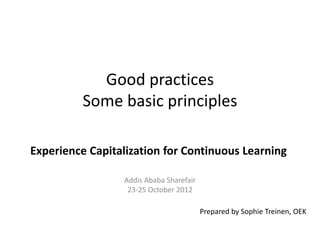
Good Practices: Some basic principles. Experience Capitalization for Continuous Learning
- 1. Good practices Some basic principles Experience Capitalization for Continuous Learning Addis Ababa Sharefair 23-25 October 2012 Prepared by Sophie Treinen, OEK
- 2. Why working on good practices? • If we do not learn from what we do, • If we do not document what we have learned, • If we don’t share this knowledge and learning, We fail to do our job … We lose our institutional memory … We will repeat the same errors … Our success will remain unknown and our good practices unshared
- 3. What is a good practice? A good practice is not only a practice that is good, but a practice that has been proven to work well and produce good results, and is therefore recommended as a model. It is a successful experience, which has been tested and validated in the broad sense, which has been repeated and deserves to be shared so that a greater number of beneficiaries can adopt it.
- 4. Criteria for a good practice 1. Effective and successful 2. Environmentally, economically and socially sustainable 3. Gender sensitive 4. Technically feasible 5. Participatory 6. Replicable and adaptable
- 7. FAO good practices website www.fao.org/knowledge/goodpractices/
- 8. Thank you.
Hinweis der Redaktion
- A good practice is not only a practice that is good, but a practice that has been proven to work well and produce good results, and is therefore recommended as a model. It is a successful experience, which has been tested and validated in the broad sense, which has been repeated and deserves to be shared so that a greater number of beneficiaries can adopt it.
- Experience capitalizationIn French: “capitalisation” in Spanish: “sistematización”Experience capitalization is an iterative processIt aims at changing or improving a practiceIts output is lessons learned and good practices; its outcome is induced changes in a a redesigned practiceThe process by which a practice (good or bad) is identified, analyzed, documented, shared and adoptedHow do we proceedWe reflect nowon what we have done in the past to learnfor the future processExperience capitalization takes place throughout the project cycle, not only at the endBy integrating it into monitoring and evaluation It requires resources, and should be planned for
- We do not proceed immediately to the adoption of a new practice simply because we are aware of its benefits. The process is more complex and requires going through steps:Once aware of a good practice, a person must also have an interest in a practice. If the person understands and is aware of how he/she can use this practice, he/she has yet to change his/her attitude or behavior. When the person validates what needs to be done to apply the practice to his/her context, then he/she can go ahead with the practice, its adoption and ownership.This process is not immediate, but is built thanks to the process of Communication for Development. This process takes time and requires openness to dialogue. See Participatory communication strategy design Handbook p 20, FAO, 2004
